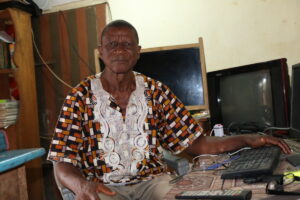One of the most significant moments of Koroma’s life occurred on May 26, 2000, when he brought 87 children to Sierra Leone’s capital, Freetown, after a harrowing five-day journey. These children were not ordinary refugees; they were former child soldiers and sex slaves, forcibly conscripted by rebel forces during the civil war. Their rescue from the city of Makeni, a stronghold of the Revolutionary United Front (RUF), was nothing short of miraculous. Koroma defied the odds, risking his life and those of his family, to lead these children to safety, traversing dangerous bush paths to escape the rebels.
Koroma’s journey to becoming a humanitarian was shaped early in life by a unique intersection of religious teachings. At the age of four, he was sent to a Qur’anic school in Port Loko, where he was meant to follow in his Muslim father’s footsteps and become an imam. However, the death of his father when he was only 11 marked a turning point. His interest in Islamic studies waned, and shortly thereafter, he was chosen by Catholic missionaries to attend St. Francis, a mission school in Makeni. It was there that Koroma converted to Christianity, embarking on a journey that took him to Nigeria, Ghana, and Liberia as part of his seminary training to become a Catholic priest. But just before his ordination, Koroma’s passion shifted once again, this time toward educating and counseling children in a conventional academic setting.
Armed with a bachelor’s degree from Northern Polytechnic in Sierra Leone, Koroma began his career as a teacher and psychosocial counselor, taking up roles in various schools, including his alma mater, St. Francis. Yet, it was the turbulent period of the civil war that truly tested his resolve and showcased his capacity for selflessness and risk-taking. The war, which left an estimated 50,000 people dead, saw unimaginable atrocities, including the forced conscription of children into rebel forces.
The peace agreement between the government and the rebels in 1999 provided a brief respite, allowing many children to be released and undergo rehabilitation. As manager of the Interim Care Center (ICC) in Makeni, established by the Roman Catholic charity Caritas, Koroma was tasked with rehabilitating hundreds of former child soldiers and sex slaves. However, the fragile peace soon collapsed, and the rebels returned to the ICC, dragging dozens of children back to the battlefield. Fearing for the safety of those who remained, Koroma devised a daring plan to smuggle the children out of Makeni in small batches, hiding them in trucks bound for Freetown. When the fighting intensified and roads became too dangerous, Koroma took matters into his own hands, leading 87 children on foot through the jungle until they reached safety in Freetown.
This act of heroism was just one of the chapters in Koroma’s long history of humanitarian work. Following the official end of the civil war in 2002, the ICC was closed, but Koroma recognized that many former child soldiers were still in dire need of rehabilitation, education, and a means of reintegrating into society. In 2005, he founded the Dante Experimental Organization, a special school that catered to former child soldiers and polio victims. Over the years, the school helped 68 former combatants and 31 polio victims rebuild their lives.
As the need for specialized rehabilitation diminished, Koroma transformed the school into a regular secondary institution, renaming it the Alagendra Secondary School after Shyamala Alagendra, a Malaysian lawyer who had worked at the Special Court For Sierra Leone set up by the UN to prosecute perpetrators of war crimes and provided crucial financial support for Koroma’s project. The school, which offers free education to children from impoverished backgrounds, now serves 280 students and has seen nearly 1,000 graduates pass through its doors. Koroma continued to rely on donations and his personal resources, including the proceeds from his small ginger farm and palm plantation, to sustain the school’s operations.
Even in the face of personal and professional challenges, Koroma’s faith and sense of duty remained unwavering. His daily routine, which began at 4:30 a.m., was steeped in spiritual reflection, with readings from both the Bible and the Quran—a testament to his belief in the unity of faiths and the importance of good works as a path to a fulfilled life. This profound spiritual foundation guided him through the many trials he faced, including his work during the Ebola outbreak of 2014, when he served as a volunteer for the International Medical Corps, counseling affected children and their families.
Although he passed away in 2022, Edmund Koroma’s legacy remains a testament to the power of faith, compassion, and perseverance. In a world that often seemed indifferent to the suffering of the vulnerable, Koroma shone bright with the light of compassion, reminding us that one person could make a profound difference in the lives of many.


